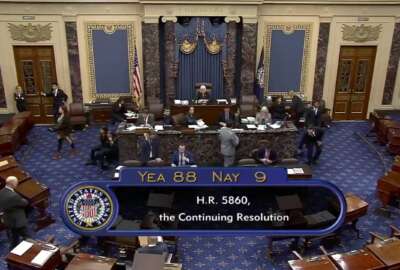If you’re not surprised there’s not a shutdown, you’re prescient or a prevaricator
To the surprise of just about everybody, the Federal Government is fully functional this Monday, October 2, 2023. Some surprise last-minute votes in both the House...
To the surprise of just about everybody, the Federal Government is fully functional this Monday, October 2, 2023. Some surprise last-minute votes in both the House and Senate on Saturday happened just in time to get a continuing resolution (CR)to the president’s desk – just hours before much of the government was set to run out of appropriations. That CR will maintain 2023 funding levels for the next 45 days – now 44 days. Loren Duggan is deputy news director and director of legislative analysis at Bloomberg Government. He spoke with Federal News Network Deputy Director Jared Serbu on the Federal Drive with Tom Temin, and took a look ahead to the next 6 weeks or so.
Interview Transcript:
Jared Serbu So, you know, I can definitely remember some situations where Congress took it down to the wire, waiting until the last minute to pass a CR. Maybe you do. I don’t remember one where almost everybody thought we were headed for a shutdown and we pulled it out at the last minute. So. So what happened over the weekend that changed things so suddenly?
Loren Duggan It’s a great point and a great question because, you know, we had had September 30th circled on our calendar for a long time and really three or four weeks of pessimism that they were going to get this done in time. But things really broke Saturday morning when the House Republicans, led by Kevin McCarthy, had this strategy plan to put a bill on the floor that matched what the Senate wanted except for Ukraine aid and a couple of other differences. But, you know, having had a very conservative plan on the floor the day before that had something like 30% cut to domestic spending that went down because not enough Republicans supported it. You had a bill that eventually was in twists and turns and maneuvers and backroom discussions. Got to something that could pass with wide support in both chambers. So Congress loves a deadline. Deadlines force action all the time on Capitol Hill. Sometimes they run close to the wire. This one felt very close, but in the end, they got it done by midnight. And the government, as you said, stays open.
Jared Serbu You mentioned that wide support, and that was the most striking thing, watching the vote totals come in on Saturday. This passed by enormous margins. It was not even close, which, you know, if you’re watching that, you start to scratch your head and say, well, why couldn’t they have done this two weeks ago?
Loren Duggan It’s a good question. And that’s because, you know, both sides had taken positions here. And in particular, when you think about conservative Republicans have been pushing and will continue to push for deeper spending cuts. This is, to your point, a bill through November 17th. We still have to be back before November 17th to talk about what to do beyond then and what to do for the rest of this fiscal year. We had a debt limit deal that had spending caps, but those spending caps have been reopened in a sense, because House Republicans have tried to push spending down. Senate Democrats and Republicans as well have essentially stuck to those caps, maybe with some idea of spending a little bit more in an emergency supplemental. But, you know, we’ve had some pretty strong positions here and a messy couple of weeks. But in the end, they were able to come to an agreement for at least a temporary plan. But this is far from over.
Jared Serbu And I think one of the reasons many people did not think this would happen is that Speaker McCarthy was not going to be willing to bring a bill to the floor that would have taken so much Democratic support to pass. Having done that, is it should we basically take for granted that his speakership is in serious jeopardy at this point?
Loren Duggan There could be a challenge as soon as this week. Matt Gaetz was on CNN on Sunday. He’s been sort of the lead opponent of McCarthy within the GOP caucus. And he said he’s planning to bring this motion to vacate a vote that would force the House to say whether or not McCarthy remains the speaker. We’ll see how that vote goes. If you know, it takes a majority to oust him. If Democrats and enough Republicans were to band together, that could force a vacancy and then a new speaker election. So that is very much an open question going into this week. McCarthy has had an uneasy relationship ever since winning the speakership after, what was it, 15 votes it took him to get the job. If we were to see an ouster of him, I don’t know how many votes it would take to get the next speaker so we could be in for a very uncharted week in a week that was supposed to, by the way, be a recess. But because of everything and the plans to debate more spending bills, they’re going to be around this week to potentially confront that.
Jared Serbu Right. Okay. So let’s turn back to the appropriations process, as you said, November 17th is the next deadline here. It feels like a while away, but maybe not considering how much work is left to do in the regular order process if they follow a regular order process. So bring us up to speed on where those standard appropriations bills are.
Loren Duggan Sure. So usually what you do is you agree to a top line number and then you come back and you agree to 12 bills that divide up that top line number. The challenge, as I mentioned earlier, is the House Republicans and the Senate Democrats and Republicans are on different pages on the total and then on each bill, they’re pretty far apart, not just in spending, but also in the riders that they put in there. So the House Republicans are debating bills, putting in significant cuts and putting in riders on things like abortion, critical race theory, DEI programs and other concerns. And like last week, they tried to nearly zero out the salary of Lloyd Austin, the defense secretary. So the House is coming up with very conservative bills they’re passing them. They’ve done four. They debated a fifth that they ended up rejecting in the end, but they’re at least in their minds, progressing, getting through these bills, sending something over to the Senate for the Senate to deal with and maybe compromise on. There are plans for two more bills this week. Now that was announced before Gaetz said that he was going to do his potential motion to vacate this week. We’ll see if they stick to that. But there’s also a schedule in mind that you could get through each of the bills over the coming weeks by canceling this two week break and focusing on that. So we’ll see if sending those things over to the Senate moves things forward. The Senate has approved 12 bills in committee. They haven’t passed any yet on the floor, but we’ll see what they’re able to get to there now that they’re over this C.R. battle.
Jared Serbu As far as those House bills, will it be fair to say that they basically all of the ones that they’ve sent to the Senate contain these riders that you mentioned that are just going to make them nonstarters on the Senate side? Are there any that are more in clean, non-non-controversial territory?
Loren Duggan No, they’ve all gotten pretty controversial, even defense, which tends to be fairly non-controversial, much like the National Defense Authorization Act, where that went from a bipartisan bill out of committee to a pretty party line bill on the House floor with the changes that were made. So, you know, the House works its will. If a majority agrees, they can pass a bill, they can adopt amendments and send that over. And that’s the process that’s playing out right now. But it’s running headlong into a Senate that has a Democratic majority and obviously there’s a Democratic president. So anything that gets through has to be bipartisan, as we saw over the weekend.
Jared Serbu And Loren, before we let you go, one non appropriations item here, I guess we’re going to expect to see the nominee for FAA administrator up on Capitol Hill this week. What are you watching for there?
Loren Duggan Yeah, Michael Whitaker, who’s the latest nominee to lead the Federal Aviation Administration, he’s going before Senate Commerce. They’ll review his nomination. The FAA had a double whammy going into the weekend. They had both the potential lapse in appropriations and this authorization was going to lapse, but that was extended through the end of the year. But you might see a big focus on this agency. It’s been without a permanent leader for a long time. So we’re looking to see if this is the nominee that can win support in the Senate, get over the line and lead that agency on a full time basis.
Copyright © 2024 Federal News Network. All rights reserved. This website is not intended for users located within the European Economic Area.
Jared Serbu is deputy editor of Federal News Network and reports on the Defense Department’s contracting, legislative, workforce and IT issues.
Follow @jserbuWFED






